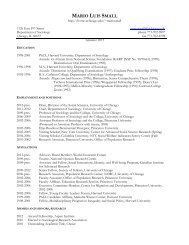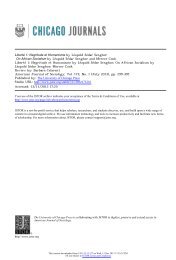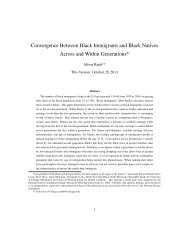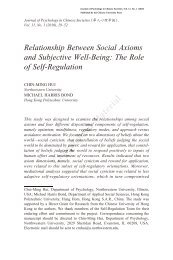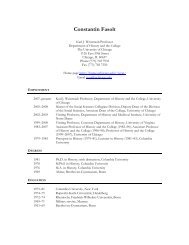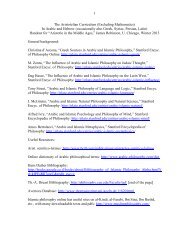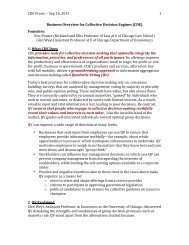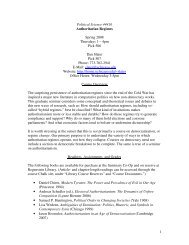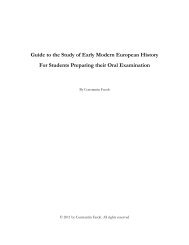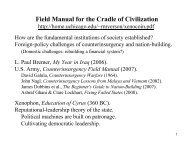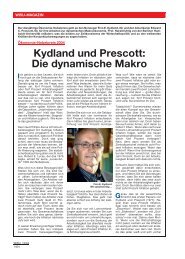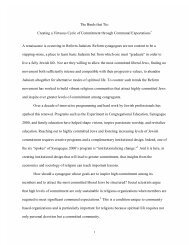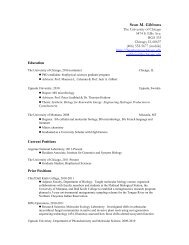Job Market Paper - Personal Web Pages - University of Chicago
Job Market Paper - Personal Web Pages - University of Chicago
Job Market Paper - Personal Web Pages - University of Chicago
Create successful ePaper yourself
Turn your PDF publications into a flip-book with our unique Google optimized e-Paper software.
Kim: Endogenous Choice <strong>of</strong> a Mediator<br />
Cramton and Palfrey (1995), which I compare to Holmström and Myerson (1983) and my setting.<br />
4.1 Durability, Ratifiability, and Assumptions<br />
Holmström and Myerson (1983) consider durability that also formalizes the idea <strong>of</strong> a mechanism<br />
being invulnerable to proposals <strong>of</strong> alternative mechanisms in a pairwise comparison. 21 They show<br />
that the set <strong>of</strong> durable interim incentive efficient mechanisms is non-empty for any finite Bayesian<br />
bargaining problem and that with one-sided incomplete information, all interim incentive efficient<br />
mechanisms are durable. However, I argue that durability does not give a strong prediction and<br />
is limiting in my framework. For the games that I study in this paper, not only is the neutral<br />
bargaining solution durable, but in fact the entire interim incentive efficient set is durable.<br />
The difference arises because <strong>of</strong> the assumptions about passive beliefs, voting, and the mechanisms.<br />
First, durability relies on the assumption that passive beliefs hold whenever an alternative<br />
is rejected that allows for only learning from agreement to the alternative. 22<br />
So when the players<br />
go back to play the status quo mechanism, they play as they could have in the first place. However,<br />
in my games, the focus is on the information that gets leaked when there is disagreement<br />
in the negotiations over selecting a mediator. This distinction reflects somewhat different implicit<br />
assumptions. Durability tries to capture the idea <strong>of</strong> one type <strong>of</strong> player proposing an alternative at<br />
the interim stage (although it is not literally talking about the player’s proposal stage), but I consider<br />
the proposed alternative as selected by an uninformed third party. Therefore, no information<br />
is revealed by a proposal itself. Thus, I assume that if an alternative is ratified, the alternative<br />
mediator is played with the original beliefs, and learning only comes from disagreement.<br />
Second, players are not told the details <strong>of</strong> the vote in Holmström and Myerson (1983) because<br />
they assume a secret ballot. I assume a non-anonymous voting procedure. This assumption is<br />
realistic because I am concerned with international relations settings in which one type <strong>of</strong> country<br />
might have an incentive to publicly announce displeasure with the possible alternative when the<br />
countries are negotiating because <strong>of</strong> the information the announcement conveys.<br />
Third, Holmström and Myerson (1983) assume a fixed direct revelation status quo mechanism<br />
and arbitrary mechanisms as proposals. Therefore, if players commit themselves to a status quo<br />
21 A similar idea has been discussed under the name resilient allocation rule (Lagun<strong>of</strong>f, 1995) in a buyer-seller<br />
bargaining problem.<br />
22 A mechanism is durable if there exists a sequential equilibrium such that if an alternative is <strong>of</strong>fered, at least one<br />
player rejects the alternative for every equilibrium path. If a player strictly prefers the alternative, he votes for it<br />
even if he thinks the other is not voting for it. And if a player is indifferent (the trembling point), then he is allowed<br />
to vote against the alternative.<br />
24



